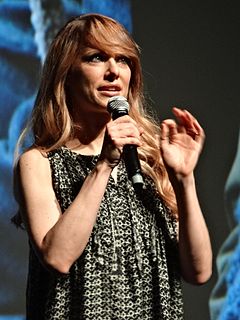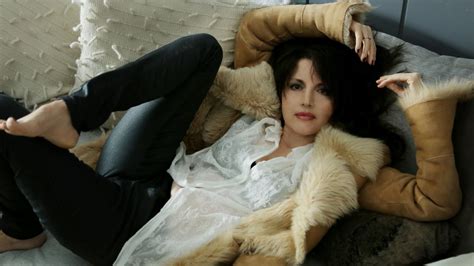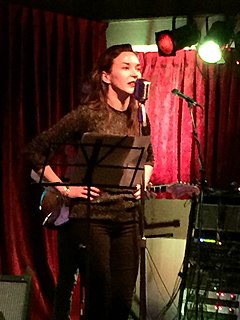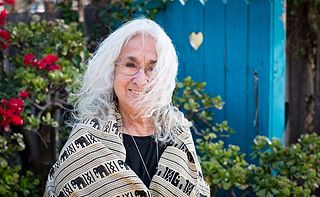A Quote by Lynn Shelton
In the collaborative process, you create a real intimacy; everybody ends up sharing personal stories and personal observations and their philosophies, their psychological side. By the time you get to set, it just creates such a sense of trust and intimacy between the director and the actors. It's really, really great.
Related Quotes
Making art, being creative, is risky, especially for actors, but everybody on the set is being creative. You're putting yourself out there with ideas, and to have your brain be free of stress so that it can actually do its best work, it feels like you want to have a real sense of intimacy and connection and trust with everybody.
Delirious as it can be, sex is only one kind of intimacy, and yet has become the cultural catchment area for all kinds of needs because our understanding of intimacy is so poor. Brutal work schedules, related geographic isolation, and the concomitant fracturing of families has meant that there is little time for intimacy, and even less to teach the necessary skills. But intimacy, the axis of romance, is slow, based on the sharing of a life rather than show. In terms of intimacy, folding laundry together or sharing the feeding of a child can have more impact than the most extravagant bouquet.
Marriage is a way to avoid intimacy. It is a trick to create a formal relationship. Intimacy is informal. If a marriage arises out of intimacy it is beautiful but if you are hoping that intimacy will arise out of marriage, you are hoping in vain. Of course, I know that many people, millions of people, have settled for marriage rather than for intimacy - because intimacy is growth and it is painful.
... if you know a person really well, the truth is you can't guess how they'll act in an altogether new sort of crisis. ... intimacy creates a special environment for two people, and the deeper the intimacy, the more they both live within it, the closer its boundaries usually are, so that all that lies beyond them becomes with time not less but more and more of a mystery.
I learned a lot from Clint [Eastwood], who's an extremely economic director. I learned a lot from Michael Winterbottom, who really gave a lot of trust in the actors and allowed them to live in the space instead of trying to manipulate and make it too set and too staged. Working with [Robert] De Niro taught me a lot of being an actors' director and what that is. I've learned a lot from pretty much everybody. Hopefully I've picked up something from everybody I've worked with.
When I write, I lose time. I'm happy in a way that I have a hard time finding in real life. The intimacy between my brain and my fingers and my computer... Yet knowing that that intimacy will find an audience... It's very satisfying. It's like having the safety of being alone with the ego reward of being known.
When I'm in the studio, I write the music, I play the different instruments, I produce it, I arrange it, and it's a self-indulgent exercise. It's the way I make my music. And when I'm acting, I get to leave myself behind, which is a relief. I get to collaborate with a director; I respect the director's medium and all the actors and actresses. So at the end of the day, it's about a character and it's about a director's vision. It's a really good balance for being so intense and alone in my personal process of making music.
I really put my heart and soul into everything and I don't want a project that doesn't feel real to me or I don't get invested in. In order to drive a show for eight or 10 years or whatever the target for doing a show is, it really has to be a part of you. Because then I can come up with stories for seasons and seasons on end. I wish I had the ability to just like the idea and get people in and drive it that way through their enthusiasm. For me, it has to be a little more of a personal thing, even if it's not a completely personal story.
One cannot really know an other without intimacy. Detached, objective observations alone leave a surface upon which it is too easy to project one's own image or fantasies. In intimacy, one respectfully interacts with the other, invites the penetration of the other, enters into a common effort, and then the strange and distinct contours of self and other become more apparent.
Digital intimacy ruins the appetite for the real thing. So, when kids are gaming or even when spouses are gaming, they lose their appetite for genuine intimacy. Kids lose their appetite for getting their intimacy needs, their hunger for significance and attachment, with the family, and it erodes the relationship between them and their parents.
Being a creative person is a really personal process so there is no one-size-fits-all advice, that's kind of the first thing I'd say. Because everybody's goals are different. Everybody's talents are different. Some women that I'm talking to want to create a television show. Some women want to be a director. They want to use comedy in different ways, and I find that really fascinating. The main thing I would say is, start! Just do it. Keep going. When people come at you with the negativity and the nos, you've got to ignore it. Push through.
Your actors need to trust you as a director, but normally, I think you just need to have an open communication between the actors and the director. I think the director needs to really paint his or her vision to the cast and let them know the kind of mood that he or she is making. I think that's very important.





































